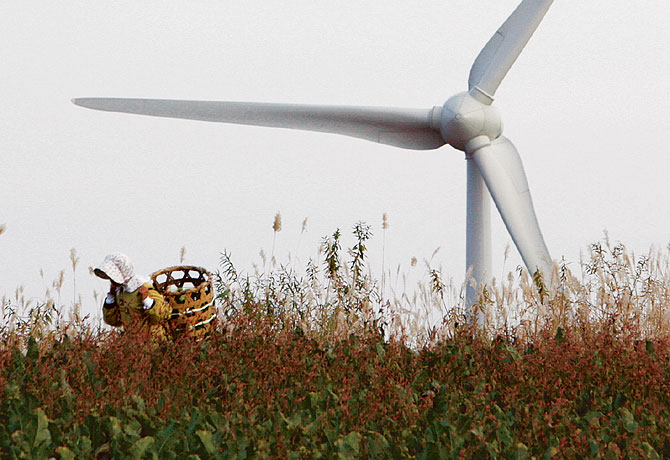
Slow turning: Japan owes its energy efficiency in part to wind farms like this one near Tokyo
Watching someone carefully rinsing out a spent mustard packet doesn't sound like entertainment, but in Japan it's big-time television. On a recent segment of Tokyo's popular morning show Hanamaru Market, a waste-recycling expert submerged a flimsy plastic packet in a tub of water, gently allowing water in and out to rinse it clean. A host of the segment stood by, watching intently, and asked if it was necessary to use soap. No, said the expert, water and a little elbow grease are all it requires.
That may sound obsessive, but sorting trash, Japanese-style, has become a rite of passage for responsible Tokyo citizenry. Gaggles of housewives think that being environmentally conscious is a trendy way to care for their families. Once Japanese people embrace an idea, they do so wholeheartedly. Environmental consciousness is no exception. Over the past 34 years, Japan has renewed a 25-yen ($0.25) per liter gasoline tax — anathema in the U.S. — four times. A decade after hosting the conference that led to the Kyoto Protocol, Japan will host the G-8 Summit on Hokkaido this year, which will focus on green issues.
As an island nation with few natural resources, Japan can't afford to be profligate. That means it has something to teach other nations. The country is one of the most energy-efficient industrial countries in the world, and some of Japan's leading companies, such as Toyota and Sharp, are known for technologies that foster greener lifestyles. A conservation mind-set is ingrained into Japanese people from birth, and is apparent in little ways throughout society. Ten years ago, when I first visited Kyoto, I was shocked that public restrooms had no soap, no dispenser full of paper towels — sometimes no toilet paper. In their purses, yamato nadeshiko (women who are, among other things, mindful and prepared) make a point to carry packets of tissue paper with them into the stall, and handkerchiefs to dry their hands. What other country would install devices to mimic the sound of a toilet flushing to discourage the waste of water by modest Japanese anxious to cover the sound of their micturition with multiple flushes?
Japan is not without sin. Indeed, when it was industrializing in the last century, Japan was as famous for environmental catastrophes as for conservation. Minamata disease, the consequence of an industrial mercury discharge, caused muscular and neurological damage for thousands of Japanese; dioxin pollution has only recently been addressed. In the 1960s, Tokyo's air had the sort of reputation that Beijing's does today. Japan's household carbon dioxide emissions have increased an estimated 40% since 1990. A visit to any department store is to bear witness to an excess of wrapping and packaging.
But the attitude of the public and the efforts of the government are slowly changing Japan. Partly, that is because of the concept of mottainai, which literally means "what a waste" and is manifest in an almost reflexive desire to conserve and reuse. Centuries before there was an environmental movement, the Japanese embraced origami, an art form — originally from China — based on the notion of creation without cutting. Fashion designer Issey Miyake adapted the concept 30 years ago in apparel made with a single piece of cloth, cut so that no pieces wind up in the garbage.
"Mottainai is not an economical concept," says Hiroyuki Torigoe, a sociology professor at Waseda University in Tokyo. "It's a mentality." When Japan was a developing country enamored of American consumption and consumerism, Japanese people thought mottainai was outmoded, says Yukiko Kada, a former professor of environmental sociology who today is governor of Shiga prefecture. Now, Japanese people are rediscovering a desire to seek "spiritual and mental satisfaction" because their basic material needs are largely fulfilled, she says. "The environment has drastically changed," says Kada. "Twenty or 30 years ago there were many fish in lakes and rivers. But that has changed drastically and Japanese have started to think, 'Where have my fireflies gone?'" With luck and some mottainai, they'll soon be back.